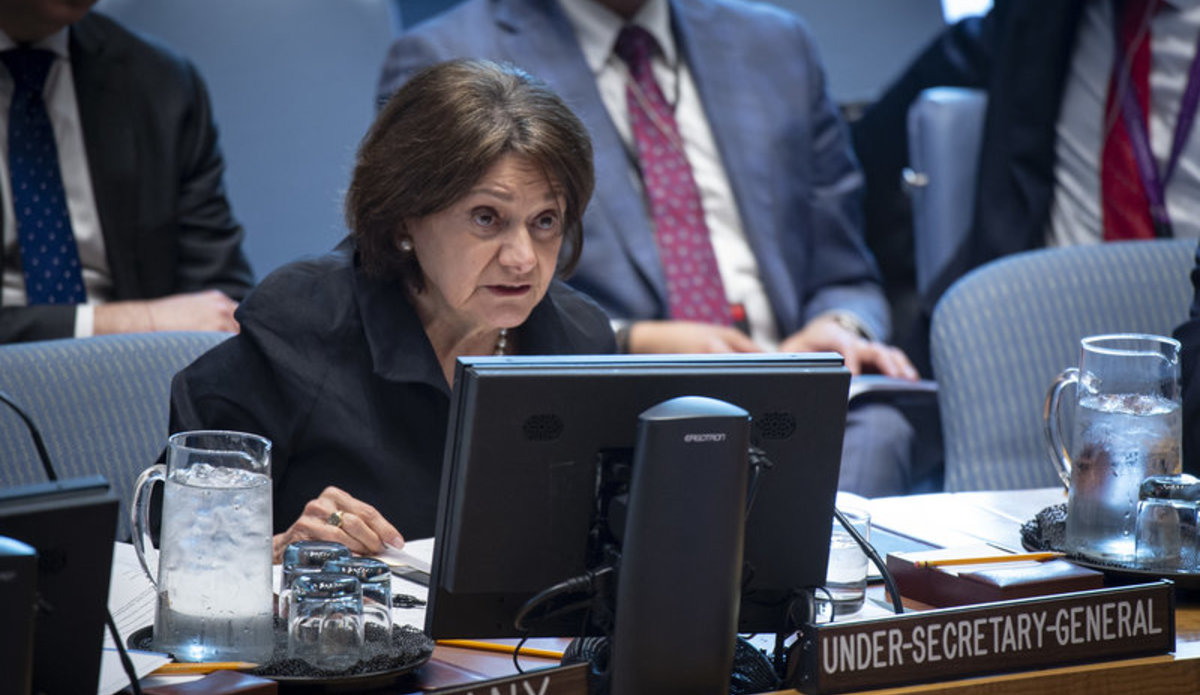Mr. President,
On 21 April, millions of Ukrainians exercised their democratic right to choose their next President. We commend the Ukrainian people on the peaceful conduct of the election and take note of the assessment of the electoral process by the international and domestic observer groups, including OSCE’s Office for Democratic Institutions and Human Rights.
The United Nations, including through its presence in Ukraine, is committed to continue working with the Ukrainian authorities and the people of Ukraine, in particular to support the provision of humanitarian assistance, the promotion and safeguarding of human rights, and the country’s critical reform process.
Mr. President,
Both the recent election and today’s Council meeting have been taking place in the shadow of the ongoing conflict in Eastern Ukraine, many of whose residents were unable to exercise their democratic rights and continue to face the daily challenges associated with an active conflict.
A lasting and durable ceasefire remains an urgent priority. In this regard, we regret the inconclusive discussions on a new ceasefire recommitment on the occasion of the Orthodox Easter, during yesterday’s meeting of the Trilateral Contact Group in Minsk. We commend the efforts of the OSCE representatives and join their calls for agreement on this important issue, without delay. We also recall that the implementation of a lasting ceasefire should be accompanied by withdrawal of heavy weapons from populated areas, disengagement of forces and protection of civilians and of critical civilian infrastructure.
ASG Mueller will brief in detail on the current humanitarian needs and the UN’s ongoing efforts on the ground. As a matter of principle, I wish to reiterate that it is essential that the UN’s humanitarian work is not politicized or instrumentalized by any party.
Mr. President,
Today’s Council meeting also takes place in the context of the Russian presidential decree of 24 April, which reportedly makes it possible for residents of certain regions of Eastern Ukraine to obtain Russian citizenship under a simplified procedure. According to the decree, the decision has been made, and I quote, "with a view to protecting human and citizens’ rights and freedoms, and guided by the universally recognized principles and norms of international lawWith a view to protecting human and citizens’ rights and freedoms, and guided by the universally recognised principles and norms of international law”. It was welcomed by the entities in control in certain areas of the Donetsk and Luhansk regions of Ukraine.
Reacting to this latest development, the Ukrainian authorities strongly protested the decree as an unprecedented interference by the Russian Federation in the country’s internal affairs and a violation of sovereignty, territorial integrity and independence of Ukraine, contrary to the Minsk agreements.
Mr. President,
In its resolution 2202, unanimously adopted on 17 February 2015, this Council endorsed the “Package of Measures for the Implementation of the Minsk Agreements”, calling on all parties to fully implement the Measures. In its Presidential statement of 6 June 2018, this Council again unanimously reaffirmed the centrality of the Minsk Agreements.
The United Nations expects that the spirit and the letter of the Minsk agreements will be respected by all concerned. To that end, we urge all parties to avoid any unilateral steps that may potentially undermine the implementation of these agreements and to address concerns through constructive dialogue in the existing negotiation formats.
Most recently, on 12 February 2019, this Council held a special session focusing on the implementation of the Minsk Agreements and on the ongoing conflict.
As was noted during our last Council briefing, the United Nations continues to fully support the lead efforts of the Normandy Four, Trilateral Contact Group and the OSCE to reach a peaceful solution to this five-year conflict.
Since their signing, the Normandy Four and participants in the Trilateral Contact Group, as well as this Council, have devoted considerable attention to promote the need for full implementation of the Minsk Agreements. Regrettably, progress has stalled.
Following the recent election in Ukraine, these efforts need to continue with greater resolve and urgency. We expect all concerned to act in accordance with the Minsk Agreements and once again reiterate the need for revitalizing diplomatic efforts.
It remains incumbent on all parties to demonstrate the necessary political will and to undertake steps that would decrease the current tensions and allow the resumption of constructive dialogue using existing mechanisms and at all levels.
Mr. President,
The United Nations underlines its commitment to the sovereignty, independency and territorial integrity of Ukraine, within its internationally recognized borders, in accordance with relevant General Assembly and Security Council resolutions.
Against the prevailing dangerous trajectory over the past five years, it is our sincere hope that at long-last a new positive dynamic can emerge to enable an end to the conflict and prevent it from becoming protracted.
This is essential for fostering national cohesion and lasting stability in Ukraine, and critical to the maintenance of peace and security in Europe.
Thank you.

